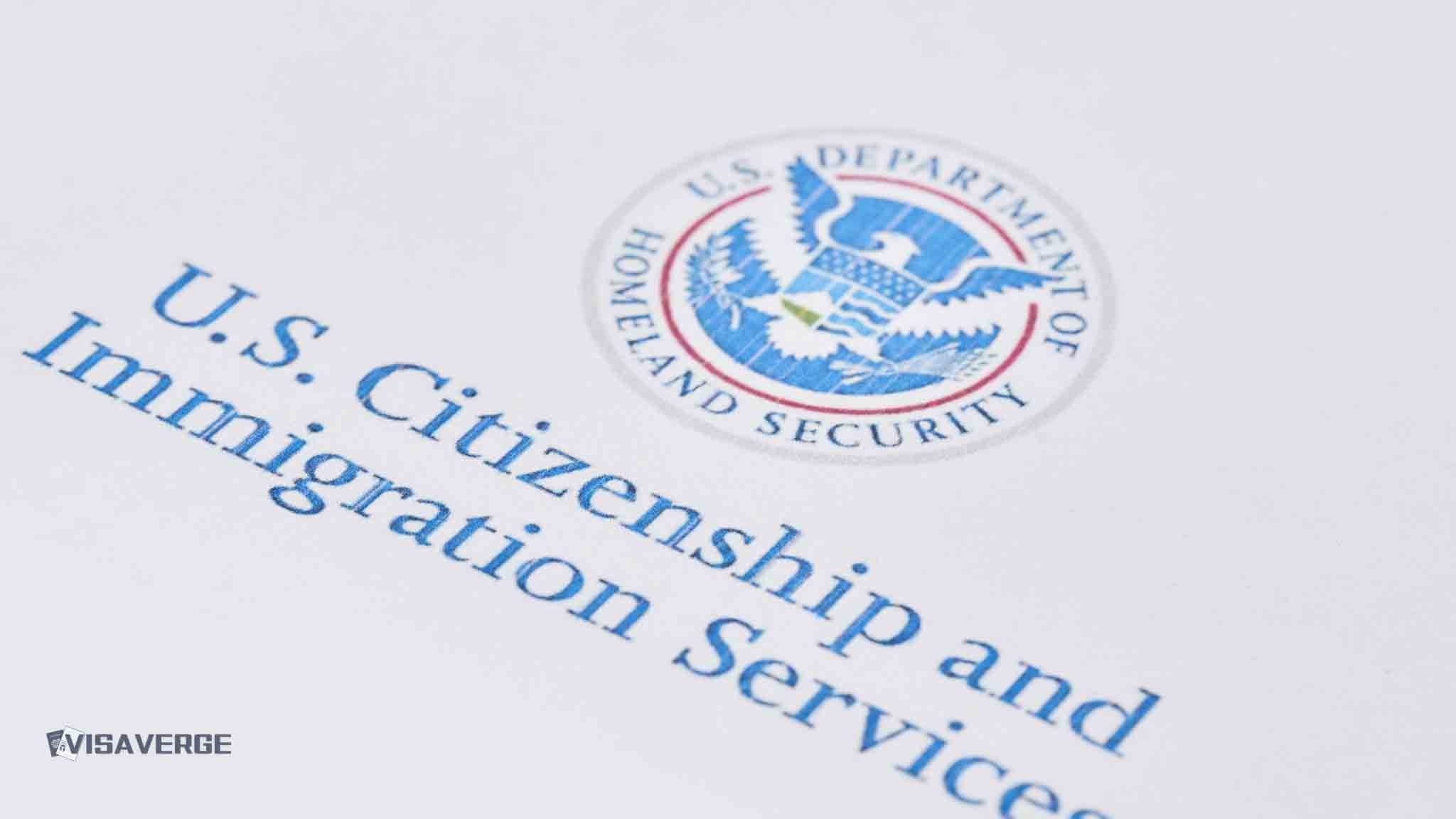Key Takeaways
- USCIS’s February 28, 2025, memorandum outlines detailed frameworks for issuing Notices to Appear (NTAs) to enforce immigration laws.
- NTAs address statutory requirements, national security, criminal activity, fraud, misrepresentation, and Temporary Protected Status denial cases with strict procedural compliance.
- Updated policies prioritize enforcement, remove prior exemptions, and emphasize case-by-case prosecutorial discretion aligned with Department of Homeland Security goals.
The recent Policy Memorandum issued by the U.S. Citizenship and Immigration Services (USCIS) on February 28, 2025, introduces a detailed framework for issuing Notices to Appear (NTAs). This guidance reinforces USCIS’s role in ensuring compliance with immigration laws, particularly concerning inadmissible and deportable aliens. The document reflects the agency’s commitment to upholding national security, public safety, and the integrity of the U.S. immigration system through standardized procedures and clear directives for its officers. Below, we provide a detailed analysis of the memorandum’s scope, implications, and procedural updates.

Overview of Notices to Appear (NTAs)
A Notice to Appear (NTA) is a legal document used to initiate removal proceedings against an individual. As explained in the memorandum, this document (Form I-862) contains instructions for the individual to appear before an immigration judge. It specifies allegations regarding the individual’s removability, the legal framework supporting these claims, and the grounds for initiating removal under the Immigration and Nationality Act (INA).
USCIS, along with Immigration and Customs Enforcement (ICE) and U.S. Customs and Border Protection (CBP), shares the authority to issue NTAs. While all three agencies play significant roles in enforcing immigration laws, this policy memorandum focuses on circumstances where USCIS has the responsibility to issue NTAs directly. By delineating these instances, the document seeks to provide uniformity and clarity to field officers tasked with implementing the policy.
Key Circumstances for NTA Issuance
The memorandum outlines several situations where USCIS officers must issue NTAs. These fall under distinct categories, including statutory requirements, national security cases, criminal cases, and other instances involving fraud, misrepresentation, or specific immigration statuses. Each category is accompanied by detailed procedural guidelines to ensure proper compliance with immigration law.
1. Statutory or Regulatory Requirements
Certain NTAs are issued because they are mandated by statutes or regulations. These include cases such as:
– Termination of conditional permanent resident status (e.g., Form I-751 or I-829 denials).
– Termination of refugee status under INA 207.
– Denials related to asylum applications or other benefits under specific programs like the Haitian Refugee Immigration Fairness Act (HRIFA) or the Nicaraguan Adjustment and Central American Relief Act (NACARA).
Officers are required to complete these actions in strict adherence to the relevant INA and CFR provisions. For instance, the denial of Form I-751 may result in deportability under INA 216 once the conditional status is revoked, thereby necessitating an NTA.
2. National Security Cases
Cases involving national security threats are a priority for both USCIS and the Department of Homeland Security (DHS). This includes individuals suspected of terrorism or espionage or those who fall under inadmissibility (INA 212(a)(3)) or deportability grounds (INA 237(a)(4)) related to these activities. When an NTA involves these grounds, USCIS must coordinate with ICE, especially in cases requiring classified information for adjudications.
3. Criminal Cases
USCIS follows specific protocols when handling cases involving criminal activity. Cases can include individuals:
– Arrested, charged, or convicted of various crimes.
– Found removable on criminal and other grounds under INA 237.
Notably, NTAs in such cases must be supported by verifiable evidence. Citations like certified conviction records are often critical to meeting these evidentiary standards.
4. Fraud and Misrepresentation
Individuals who engage in fraudulent activities or provide false information during the application process are also subject to NTAs. In such cases, even if a benefit request is denied for reasons unrelated to fraud, USCIS may still issue NTAs based on evidence of misrepresentation. Officers are instructed to consult with USCIS legal counsel in unclear cases to ensure legal sufficiency.
5. Temporary Protected Status (TPS)
In TPS-related cases, USCIS will issue NTAs when the agency denies an individual’s TPS designation, provided the individual lacks other legal status to remain in the United States. Officers are expected to coordinate with ICE before issuing NTAs in cases involving TPS beneficiaries whose countries of designation have been terminated.
Additional Special Circumstances
USCIS also has discretionary authority to issue NTAs in unique scenarios, such as family reunification cases or certain naturalization cases. For example:
– When naturalization applicants are found to have been inadmissible at the time of obtaining lawful permanent resident (LPR) status or are found deportable under INA 237.
– Scenarios involving former TPS beneficiaries with no lawful immigration status.
– Cases where asylum status has been erroneously granted or subsequently rescinded.
In these instances, officers must exercise caution and ensure NTAs meet all legal standards provided under the INA and USCIS policy.
Considerations for National Security and Public Safety
One of the policy’s central tenets is the prioritization of cases involving national security or public safety concerns. In these instances, USCIS reinforces its coordination with ICE to prevent overlapping efforts and maximize efficiency in identifying and removing threats. According to the memorandum, this process is particularly critical in cases involving classified information or complex criminal charges.
Prosecutorial Discretion
Prosecutorial discretion remains an important tool for USCIS in applying immigration policy. Officers may decide to refrain from issuing NTAs in certain situations, such as when law enforcement investigations or other significant priorities make immediate removal inadvisable. However, the exercise of prosecutorial discretion requires thoughtful analysis of individual case factors and must align with DHS enforcement goals.
USCIS is committed to tracking all instances of prosecutorial discretion. Official records are updated to reflect analyses and decisions that support such actions. All evaluations are conducted on a case-by-case basis to ensure fairness and transparency in the adjudication process.
Broader Implications
The updated procedures mark a shift in USCIS policy away from prior exemptions for specific categories of individuals. For example, the updated guidance no longer exempts certain classes of removable aliens from enforcement actions. This change reflects a broader federal initiative to strengthen immigration enforcement and ensure all categories of inadmissible and deportable aliens are held accountable under the INA.
It is important to acknowledge, however, that these policy updates can have significant consequences for various immigrant communities. For example:
– Individuals seeking family unification or adjustment of status may face prolonged delays if NTAs are issued in error or without sufficient evaluation of their eligibility for relief.
– TPS beneficiaries may experience uncertainties during transitions triggered by the termination of their country’s designation.
Despite potential challenges, USCIS also emphasizes its discretion to accommodate unique individual circumstances, especially in cases involving humanitarian considerations.
Conclusion
The updated memorandum provides a comprehensive and detailed approach to the issuance of Notices to Appear by USCIS. By framing NTAs as a critical mechanism for enforcing immigration laws, USCIS reinforces its commitment to public safety, national security, and the integrity of the immigration system. The procedural updates demand strict adherence to statutory and regulatory guidelines, ensuring that inadmissible and deportable aliens are properly identified within the framework of removability under INA.
For further details, individuals can consult the official USCIS website, where the memorandum and supplemental guidance documents are available. Analysis from VisaVerge.com underscores the importance of understanding these changes and preparing for the potential implications of intensified enforcement efforts.
As USCIS works toward steady implementation of these policy updates, stakeholders, including applicants and practitioners, should remain vigilant and fully informed of their rights and responsibilities in the immigration process.
Learn Today
Policy Memorandum → A formal document issued by a government agency, providing detailed guidance on implementing specific policies or procedures.
Notice to Appear (NTA) → A legal document (Form I-862) initiating removal proceedings by instructing an individual to appear before an immigration judge.
Immigration and Nationality Act (INA) → The primary U.S. law governing immigration, defining rules about admissibility, removability, and legal statuses.
Prosecutorial Discretion → The authority to decide whether to pursue enforcement actions based on individual case circumstances and broader policy priorities.
Temporary Protected Status (TPS) → A legal protection granted to individuals from designated countries facing crisis, allowing temporary residence and work eligibility in the U.S.
This Article in a Nutshell
USCIS Updates NTA Framework: What It Means
The USCIS Policy Memorandum issued February 28, 2025, standardizes when officers issue Notices to Appear (NTAs) for removal proceedings. Prioritizing cases involving national security, fraud, or criminal activity, the guidance seeks consistency in enforcing immigration laws. Applicants should stay informed as these changes could impact their eligibility, processes, and long-term status.
— By VisaVerge.com
Read more:
• Decoding 221(g) Notices: What Each Color Means for Your Visa!
• Understanding H-1B Visa Approval Notices: I-797, I-797A, I-797B, I-797C
• Understanding the Difference: NOID vs. NOIR – What are Immigration Notices?
• How Global Changes Are Shaping H-1B Lottery Outcomes
• H-1B Modernization Rule Could Change How Visa Lottery Works













